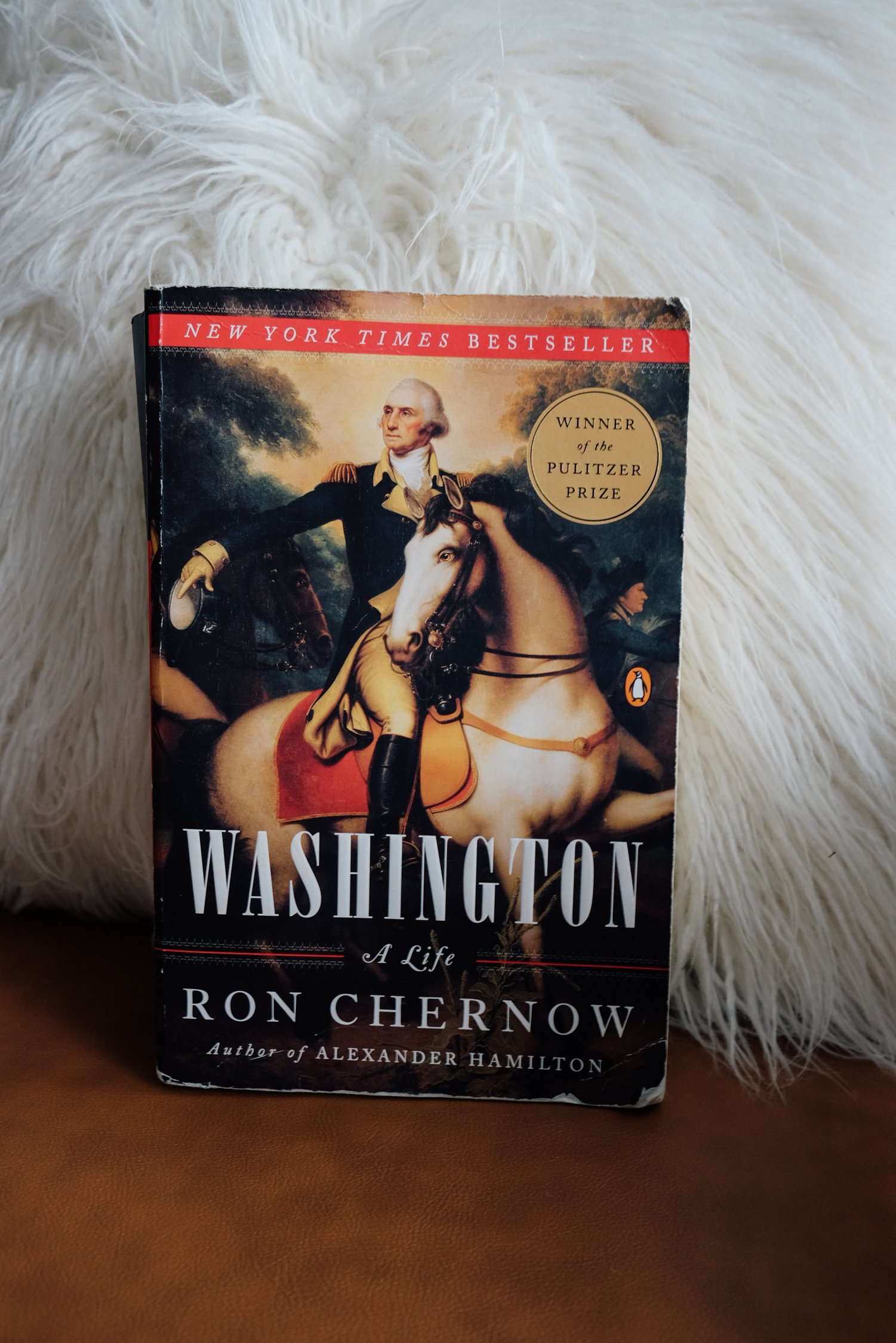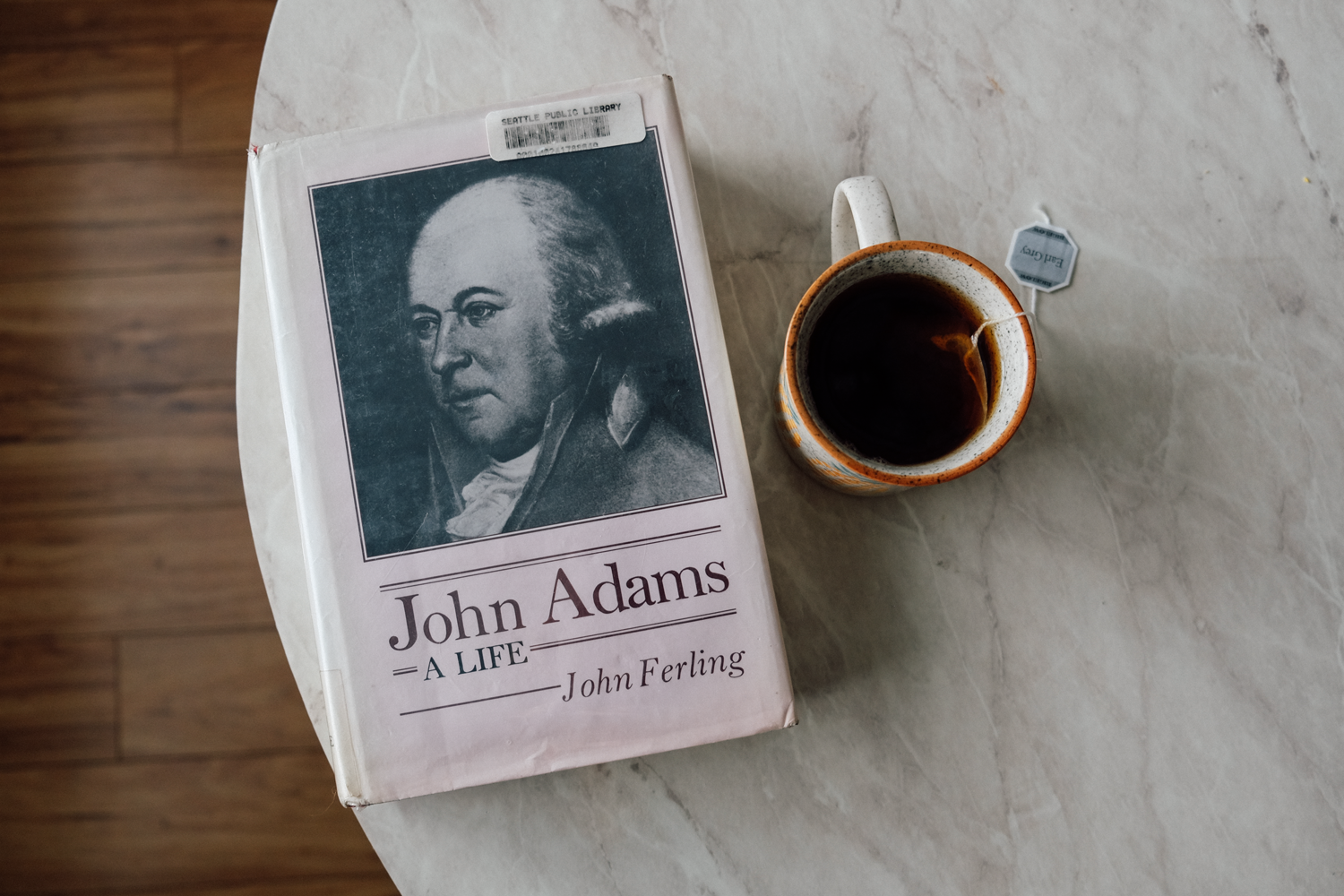About a year ago, I posted the kick-off to a personal growth project: reading biographies of all forty-four men that have served as President of the United States. It’s been slow going, I’ll admit, but it’s picking up speed with newfound confidence: I recently finished John Adams’ 500 page biography in less than three weeks.
Although I began Chernow’s Washington: A Life last November, I finished it just a couple of weeks ago, which of course I’m not proud of but it’s how life’s ball bounces. I thought I’d wrap up those two first presidential bios here in a tidy little package, before I take a little political reading break for the holidays and try to track down a fluffy, twinkle-lit romance (currently accepting recommendations).
Washington: A Life by Ron Chernow
Hands down, one of the greatest books I’ve ever read. To be fair, I’ve always been a big fan of Washington’s so I was eager to know every detail of his life from his farms to his correspondence to his teeth. At over 900 pages, Chernow’s writing may not be considered concise, but when considering he fit the long and full life of arguably the most important man in American history within so many words, it feels shorter than it is. Don’t be afraid—the only reason it took me a year to finish was because I stalled for something like six months in the middle, and read slowly. Too slowly.
With a book of this size, I know now, it’s rather important to set reading goals. I cruised through hundreds of pages at a time when I was invested, but once in awhile could barely finish a chapter (okay, fine, a single page) in a sitting. Setting a daily page goal or reserving twenty minutes in bed each or every other night just for reading makes a big impact on your progress.
I imagine it’s tough to write a biography without being biased—if you’re going to spend ten years researching and writing about someone, you must like them, and Chernow clearly does Washington. While the General was certainly an upstanding and magnanimous person, he had his flaws, and Chernow doesn’t shy away from them. As an example, although slavery wasn’t abolished for another hundred years, abolition was beginning to gather steam in the late 1700s, but Washington was not in a hurry to free any of his slaves. Chernow goes into detail about how much Washington cared for his slaves and treated many of them like family, but at the same time specifies that is no excuse for such an abhorrent practice.
However, the most common words to describe Washington are these: honest, commanding, regal, noble, heroic…all large and imposing words to describe a large and imposing man. You always hear about the way people reacted when he walked into a room—that’s one use I would find for a time machine. I imagine breathing the same air as this man would be somewhat of an out-of-body experience, especially knowing how highly regarded he's come to be hundreds of years later.
As a big fan of Lin-Manuel Miranda’s Hamilton, it was familiar and exciting to me to read about all the “characters from the show” (I quote because they are real people in history), especially in the context of Washington’s life rather than Alexander Hamilton’s, which I’m now quite familiar with. Chernow provides several pages of back story for each key figure in Washington’s life—Martha, Hamilton, Lafayette, Jefferson, and more—that gives the reader a better understanding of their interactions without becoming a biography of anyone else.
Washington has always been my favorite president, and reading about him only solidified my love for the man. I’m very interested to read about the other dynamic characters in the presidential line-up, but for now, Washington is the man to beat, and will be for a long time to come.
John Adams: A Life by John Ferling
Historical figures never feel truly real to me—it seems they are so far in the past, it’s hard to believe they were ever alive and breathing just like we are today. It’s dazzling to have them come alive on the page through detail and even direct quotations—it’s inspiring even to see how they wrote back then. It makes them feel human.
John Adams was someone I was expecting not to like going into the book, and I was right. A quote from historian Edmund S. Morgan flawlessly sums him up in the final chapter: “John Adams was very nearly a great man.” The afterword revolves around the definition of what makes a man great, and for all of his faults, I will agree with Ferling that Adams’ greatness lie in his steadfast dedication to seeing America’s independence through from beginning and onwards. He made astounding personal sacrifices to succeed professionally—sacrifices that most people these days would simply call abandoning his family, which is shameful in one way but was a phenomenally important factor in securing our nation’s independence. Precisely that: a sacrifice.
I just realized I’m thinking about an episode of Younger, one of the silliest and simultaneously addicting television shows on right now (it’s on TV Land starring Hilary Duff, to put it in context). A female author is shamed for taking two years off from “being a mom” to write a book, leaving her husband to care for their two daughters and expecting to be welcomed back with open arms. Her argument? That no one would bat an eye if a man did the same thing, which, they do, all the time. I find her rebuttal to be quite accurate. John Adams’ treatment of his family was not discussed in public, but something that his wife Abigail complained about privately. It was such a prevalent part of the book that it really comes to define Adams’ personality: very much a loner.
Ferling’s writing doesn’t exactly leap off the page, but it did keep me very well interested in a man I knew I wasn’t going to like. He provided wonderful narratives about his interactions and correspondences with colleagues—all of my favorite moments of the book included seeing how Adams interacted with both friend and foe. You really never knew what he was going to do next. I’ll say, it’s an incredible feat to keep a reader fascinated by someone they dislike. Well done, Ferling.
One more point: it was absolutely thrilling to follow Adams’ life directly after finishing a book on Washington’s. You have General George Washington, a tall and brave Commander-in-Chief who spent years in battle and earned well-deserved accolades for his commitment to service. Then you have John Adams’, a man who never fought in a war but decided to don a military outfit once he was elected to the presidency—Commander-in-Chief indeed. Reading about the American Revolution from each side of the stage…it blew my mind. Washington’s struggle to communicate with Congress, the state of the troops, his correspondence with the other Generals and the British alike contrasted with John Adams’ point of view, who actually sat in Congress during the Revolution, communicated with other Generals and the British, and essentially had a 180 degree different experience than Washington in the war…just fantastic. I highly recommend each book, but they work wonders together as a pair.
Jefferson is up next, but first let me take a week to go cruise the western Caribbean without having to think about politics. After dwelling on Washington for the last year and speeding through an intensive 3 weeks with Adams...this girl needs to sit under her own vine for a spell.



